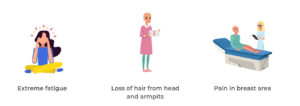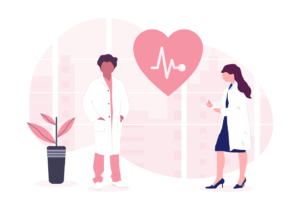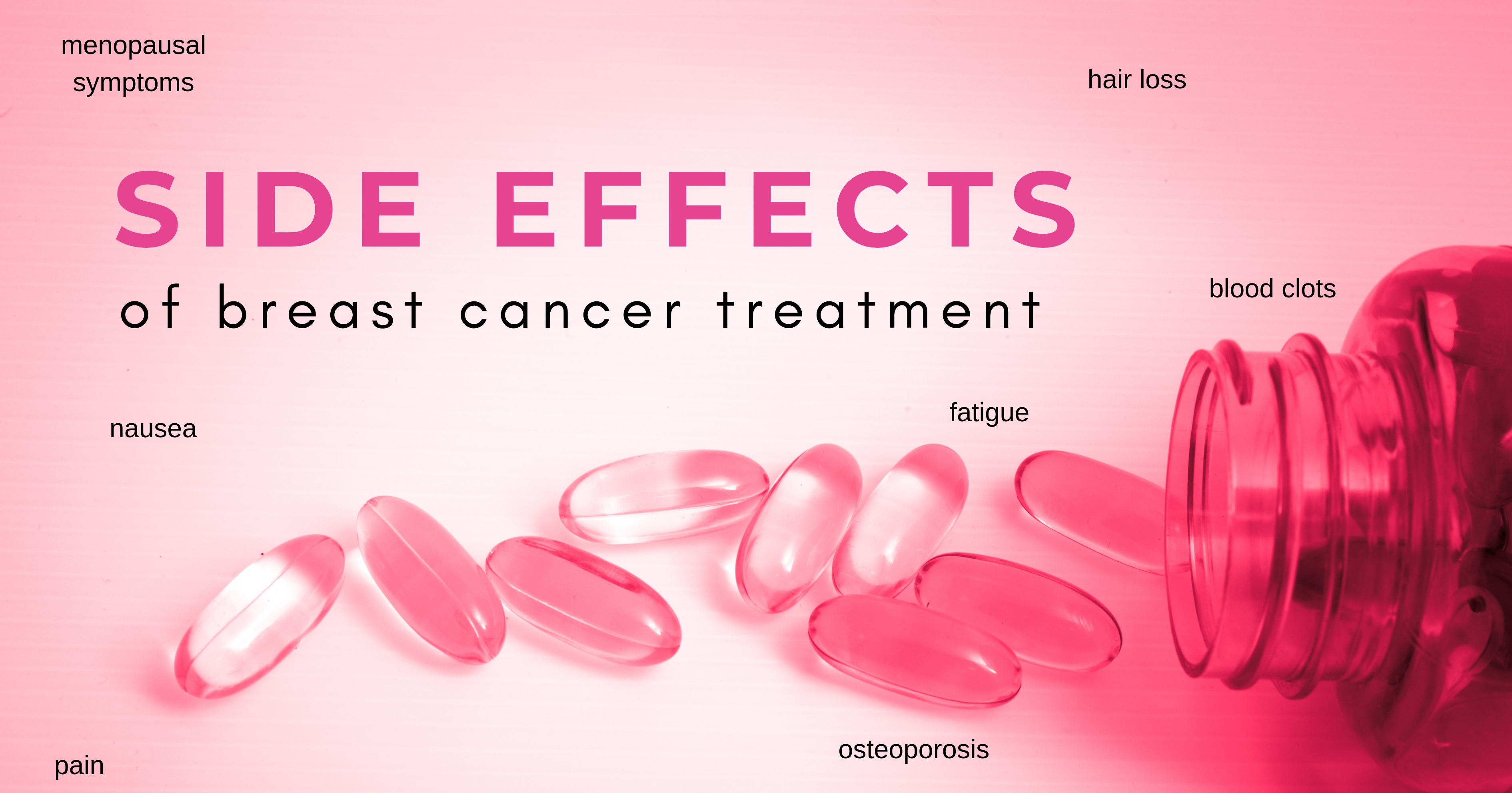The impact of the diagnosis leaves a patient traumatised, leading to a multitude of distressing feelings. Majority of cancer patients experience severe emotional distress during and after the treatment. In such a scenario, you may like to consult a psycho-oncologist. Psycho-oncologist will give you the space to speak out about your emotions, you can vent out your feelings and mostly these sessions are helpful. After conversing with them, you are more likely to feel relieved. While sharing your experiences, you enrich their experience too. Indirectly, your story can become someone’s inspiration, so be as open as possible.
Healing from the exertion of breast cancer treatment is not easy. Cancer affects you physically and emotionally. In this article, we shall reflect on the side effects specific to breast cancer. More often, the side effects persist which are like reminders of your breast cancer. Thus it is important to attend regular follow-ups with your psycho-oncologists, for better physical and emotional recovery. The side effects can be short term, which go away after a while, and long term, which stay for months or years after the treatment is over. Some of the side effects can also be permanent, but this certainly does not indicate that you should give away with catastrophic thoughts in mind.
There is always hope. There is always something to do.
Healing from the breast cancer treatment is not easy,it is rather long, painful and demands perseverance. If you feel that you need help, feel free to resort to credible breast cancer care groups for sharing your story. Sharing the pain often reduces it.
If you have lost your partner or a close relative to breast cancer, you can share the story of your journey as a caregiver also.

SIDE EFFECTS OF CHEMOTHERAPY:
Before we discuss about the side effects, it is worth mentioning here that the side effects vary from person to person. No two people having the same medication may have the same feelings. Prior to the treatment, make sure your oncologist’s contact is handy with you so that you can report any uneasiness immediately to him/her.
- EFFECTS ON BLOOD
Chemotherapy affects the ability of bone marrow to produce white blood corpuscles necessary for fighting infections. During chemotherapy, there will be regular blood tests done to ensure that your bone marrow is producing ample white blood corpuscles. If the number of WBC is too low (neutropenia), the next chemotherapy session may be delayed or the dose reduced.
Anaemia is another side effect that might appear. A blood transfusion may be required in order to replenish the red blood cells. In the interim, you may feel dizzy or breathless due to low red blood corpuscles count.
You may take necessary safety precautions like maintaining proper hygiene, avoiding contact with persons suffering from infectious diseases, taking regular meals at proper intervals etc. to reduce the risk of any infection happening to you.
- EFFECTS ON BLOOD
- HAIR LOSS
Chemotherapy is often followed by permanent hair thinning or hair loss. This happens due to damage to healthy cells that have been done during the treatment. You may choose to use a scarf or a hair wig. Please take protection from the Sun and cold during this time.
Hair loss is often the most distressing side effect of cancer, as it kind of labels a cancer patient and is like a constant reminder of having undergone chemotherapy. During this time, you may like to speak to different breast cancer support groups, a psycho oncologist, or other survivors. Maintaining a healthy lifestyle with proper meals would help in hair regrowth, although there is evidence of permanent hair loss after chemotherapy.
Your partner can also be your emotional support during these difficult times when your usual looks undergo a change, difficult to adapt to.
- HAIR LOSS
- EFFECTS ON SKIN
Some chemotherapy drugs make the skin more sensitive, prone to allergies or rashes. The appearance of nails might also change. They can lose color and become more brittle. Keep your skin and nails well moisturized, to avoid irritation.
Avoid exposure to the Sun, and cover yourself nicely if at all you need to go out.
- EFFECTS ON SKIN
- PAIN IN THE CHEST OR BREAST AREA
Twinges, aches or sharp pain in an around your breast area may occur after radiotherapy. Although these are usually mild, these may continue for years after the treatment is done.
- PAIN IN THE CHEST OR BREAST AREA
- LYMPHOEDEMA
This causes areas around the arm and chest area to swell due to build up of lymph fluids of the body. This happens when the lymphatic system of the body, especially around the breast area, has been surgically intervened during the treatment.
Lymphoedema is a long term condition, and is unlikely to go away easily in some cases, therefore dealing with it patiently is the best solution.
- LYMPHOEDEMA
- PALMAR PLANTAR SYNDROME (Often called the hand foot syndrome)
Common symptoms include burning sensations, redness, blisters, swelling, itching or rashes. Severe symptoms may also appear like nails being removed from nail beds, ulcers, difficulty in walking and severe pain.
Depending on the drug dose that has been given, the symptoms vary. To reduce the severity and discomfort, you should inform your chemotherapist at the slightest onset of any of these symptoms. You may be given a follow-up medication for this.
- PALMAR PLANTAR SYNDROME (Often called the hand foot syndrome)
- PERIPHERAL NEUROPATHY
Peripheral neuropathy happens when nerves, most commonly in the fingers and toes, are damaged. Since these are long nerves, they are more prone to damage. This is mainly caused by breast cancer treatment.
Common symptoms include pain, increased sensitivity, difficulty in doing tasks that require quick movement of fingers or toes and numbness. Inform your therapist right away if you experience any of these symptoms.
The symptoms would be reduced slowly after the medication is withdrawn.
- PERIPHERAL NEUROPATHY
- NAUSEA AND VOMITING
Usually easily controllable, nausea and vomiting are experienced by patients undergoing chemotherapy. The intensity and frequency depend on the type of drug that has been taken. You would be given medication to relieve you from nausea. If you still have severe dehydration (can be diarrhoea or vomiting), inform your therapist immediately.
Nausea can start immediately after chemotherapy and last for several days after treatment has been completed. Keep yourself well hydrated during this time. Other digestion problems like heartburn can also occur rarely.
- NAUSEA AND VOMITING
- MOUTH AND DENTAL PROBLEMS
Chemotherapy can cause sore mouth and ulcers, bleeding gums and dry mouth. Your sense of taste may also change during this time. The regular food might feel very bland, but it generally returns to normal after the medication is over.
- MOUTH AND DENTAL PROBLEMS
- CHEMO BRAIN OR CHEMO FOG
Chemotherapy can affect your ability to concentrate on something. This is called cognitive impairment. It leads to a person becoming forgetful and less organised.
The easy way to cope up with this is to keep a diary of reminders handy. Make a schedule of all your medications so that you do not miss any doses. You may also try meditation to calm yourself, and spend some time with puzzles or word games to keep your mind “busy”. These activities would help you overcome the chemo fog.
- CHEMO BRAIN OR CHEMO FOG
- MENOPAUSAL SYMPTOMS
Chemotherapy and hormone therapy affect the ovaries, which produce oestrogen.
The menstrual cycle may become irregular. You may experience hot flushes, sweats and frequent mood swings along with vaginal dryness. Your breast cancer care nurse can help you if you develop these symptoms.
Since your sex hormone levels can be affected, your chances of becoming pregnant also get affected at the same time. If you are planning to have a child, you may like to consult a fertility clinic and take proper medications.
Chemotherapy can cause infertility in pre-menopausal women.
- MENOPAUSAL SYMPTOMS
- BLOOD CLOTS
If breast cancer has reached the secondary level, there are high chances of having blood clots in the body. If you experience pain, swelling, redness or tenderness, shortness of breath and cough, report the same to your therapist immediately.
Blood clots are usually treated with coagulants, which shall be prescribed thereafter.
- BLOOD CLOTS
- BREAST CANCER AND OSTEOPOROSIS
Breast cancer treatments like chemotherapy and radiotherapy can reduce bone density. This can increase the chances of your bone getting fractured. You would ideally undergo a DEXA (dual energy x-ray absorptiometry) scan test to determine if there are chances of osteoporosis.
- BREAST CANCER AND OSTEOPOROSIS
COPING UP WITH THE SIDE EFFECTS:

Regular Exercise: Light physical activities like yoga or a small walk with your pet is proven to reduce swelling, fatigue and depression.
Physiotherapists play an important role in post surgical manual therapy. They shall use skilled hands on treatment to the joints, muscles and scar which reduces restricted range of motion, pain and swelling. You would be doing gentle stretches in order to improve your mobility.
Physiotherapists also help in emotional rehabilitation. They are mostly great listeners with whom you can share your pain, both physical and emotional. More often, they also have a lot of stories to share.

Medication: For gastro-intestinal side effects like vomiting, diarrhoea or constipation, you would have to resort to medication.

Joining a Support Group: Certain side effects like hair loss or menopausal symptoms cannot be cured with medication. These are usually the most stressful side effects that one has to go through. You may want to speak to someone about these and how you feel about your journey. You may join one or more credible cancer support groups and share your story of enduring breast cancer and it’s side effects.
If you prefer a more private setting, meet with a counselor or try cognitive behavioral therapy to manage some of the emotional, mental, and mood challenges. Expressing your feelings and accepting yourself in your present appearance goes a long way in coping with the stress. If you are feeling bad, you can choose to tell your family members that it has been a bad day and take some rest. You may also ask your caregiver to sit with you and listen to you.
